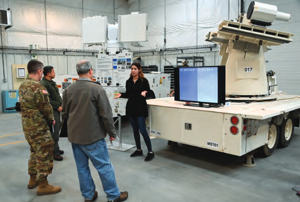
21 Feb Yuma Proving Ground hones support of Army’s new operational concept
YUMA — As U.S. Army Yuma Proving Ground (YPG) tests military equipment for the Army of 2030, its leadership has embarked on an ambitious program to prepare for the future mission.
A major component of this preparation is the Employee Modernization Effort for Relevant Growth and Enrichment (EMERGE) program, stood up last year with an initial investment of $270,000.
The program’s efforts at preparing the workforce for the future test mission is wide-ranging and comprehensive, covering everything from developing new test methodologies for advanced technologies to leadership strategies and critical thinking.
“I wanted to start a program that modernizes our workforce,” said Col. Patrick McFall, YPG Commander. “It was important to me that this program be made by our workforce, for our workforce.”
In October 2022, the U.S. Army announced a revised Operations Field Manual 3-0 that discussed multidomain operations (MDO) as the force’s new operational concept. The strategy concerns successfully defending against near-peer adversaries able to oppose America’s joint forces in all domains: land, sea, air, space, and cyber.
With a significant testing workload on behalf of the Army Futures Command and experience hosting Project Convergence 2020 and 2021, as well as Project Convergence Technology Gateway last year, YPG’s efforts have been at the frontline of ensuring American forces can retain overmatch against any potential adversary. Still, YPG senior leaders deemed a formal understanding of the new doctrine essential to maintaining the post’s position at the forefront of Army modernization efforts. Toward that end, the proving ground arranged for instructors from the Army War College in Carlisle, Pennsylvania to lead a two-day seminar on MDO at the proving ground.
“In order to support the Army operating in this way, we have to understand it,” said Paula Rickleff, YPG Workforce Development Coordinator. “This is the first step in getting our people from the staff level to the testers educated on the doct r i ne.”
Senior leaders from across the Army Test and Evaluation Command (ATEC) were invited to participate, and ultimately more than 40 individuals were enrolled in the seminar.
“Everyone having that basic knowledge of the doctrine will really facilitate conversations on how we in test and evaluation will support an MDO environment—what are our constraints, what do.
we need, what do we need to start thinking about now,” said Rickleff. “It is here, and only going to get bigger.”
Three instructors from the Army War College arrived early and devoted an entire day to comprehensive briefings from YPG’s senior leaders and a tour of some of the post’s major test facilities to learn more about the mission and tailor their curriculum to ensure it was relevant to the command’s specific needs. The instructors also held a nearly hour-long conference with YPG senior leaders after the first day of instruction for additional feedback and input concerning the subsequent day’s discussion topics and activities. The curriculum was heavy on practical exercises to draw out specific aspects of the MDO concept that developmental testers will have to adapt to in the future. The seminar got rave reviews from those who attended.
“It was good in two ways,” said Omar Silva, YPG Range Operations and Training Division Chief. “First, the Army War College instructors brought a baseline level of what the Army understands multidomain operations is. Secondly, now that we as an ATEC senior leader group have a common understanding, we can have discussions about what MDO means for us and plan accordingly.”
“There was a lot of energy in the room,” added McFall. “People came alive during the discussions and were really taking this in.”
